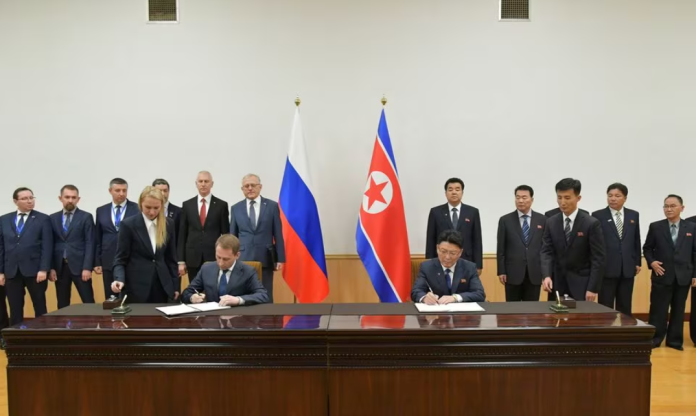A Russian delegation led by Natural Resources Minister Alexander Kozlov has arrived in Pyongyang amid North Korea’s announcement of new progress on its banned ballistic missile programme.
When Kozlov arrived on Tuesday, US Defence Secretary Lloyd Austin was meeting with UN member states in Seoul. Austin expressed concern that China and Russia are helping North Korea expand its military capabilities, allowing Pyongyang to avoid UN sanctions.
Kozlov stated that Russia wanted to develop “substantial cooperation” with North Korea based on agreements made by Russian President Vladimir Putin and North Korean leader Kim Jong Un during their meeting in September in the Russian Far East, according to KCNA.
He also highlighted North Korea’s “full support” for Russia on regional and international issues. On Tuesday, a North Korean delegation led by the culture minister left for St. Petersburg to attend a cultural event, KCNA reported in another article.
North Korea will soon finalise preparations to launch a spy satellite, presumably after receiving technical assistance from Russia, South Korea’s intelligence agency reported. North Korea’s state media also announced on Wednesday that the country had successfully conducted static tests of “new-type high-thrust solid-fuel engines” for intermediate-range ballistic missiles (IRBMs).
The test provided a sure guarantee for reliably accelerating the development of the new-type IRBM system.
North Korea’s General Missile Bureau claims the recent test of the new IRBM is essential to improving the military’s strategic offensive capabilities in light of “the grave and unstable security environment facing the country.”
The announcement coincided with a joint US-South Korean air exercise involving a US B-52 strategic bomber and fighter jets as a demonstration of power.
Military analysts say solid-fuel missiles are easier and safer to operate and require less logistics, which makes them harder to detect and more survivable than liquid-fuel weapons. North Korea tested its first solid-fuel intercontinental ballistic missile (ICBM) this year.
North Korea’s missile programme, as well as its nuclear weapons, have been banned by UN Security Council resolutions that imposed sanctions on the country. Washington and Seoul has accused North Korea of supplying military equipment to Russia for use in its war with Ukraine, and Moscow of providing technical military support to North Korea.
The two countries have denied any arms deals, although their leaders pledged closer military co-operation at a September summit.
